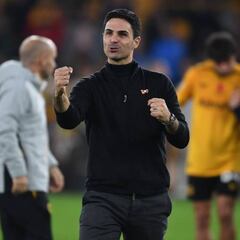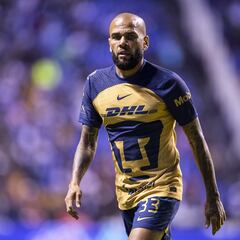Rüdiger: “I bust my head open for the team, that’s who I am”
The Real Madrid centre-back sat down to chat to AS about the World Cup, his difficult early life in Berlin and his working relationship with Ancelotti.
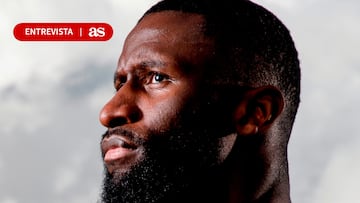
Antonio Rüdiger took time out to chat to AS from his home via video call. Out on the pitch he’s a whirlwind, but off it, he’s the complete opposite - reflexive and mild mannered. He spoke passionately about his childhood, of the important role his family played in his education as well as the therapeutic trips he makes to Sierra Leona, where he has roots. His career has taken him to Real Madrid and he is determined to make the most of the experience. “I split my head open for the team,” he explained with reference to his winner against Shakhtar Donetsk. “That’s the person I am...”.
Is Madrid how you imagined it to be?
I wasn’t really able to imagine anything because, to be honest, my big dream was to play in the Premier League. I never thought that a move to Real Madrid as something that would happen to me. It never entered my head. I was really happy and settled at Chelsea. But as soon as you realise that Madrid want to sign you, you think: Wow! Then all of a sudden, as soon as you arrive, everything is much bigger, everything is spectacular…
Can you remember the moment when you heard that Madrid wanted to sign you?
I was in London with my brother. He was the one who told me. I couldn’t believe it! Even now I can’t explain how I felt. It still gives me goosebumps.
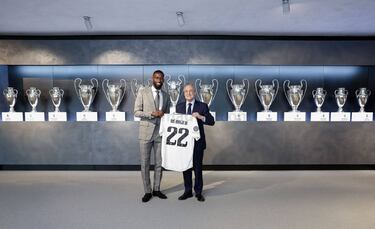
How have the first few months at the club been? A new house, a new school for the kids…
When you move to another country, you have to adapt in many ways, especially with all of the things outside of football. Really, there is only one language in football. It’s easy. But that’s not quite the same for everything else. But I am very lucky, my family loves being here, my kids are happy going to nursery school… And if they are happy, then I am too. As for everything else, I am also happy with the pressure to win that exists at this club, it’s something I relate to.
How do you keep yourself occupied when you’re not playing football?
I like being with my family. I don’t talk about football, I just enjoy being with them, going for walks. When I was younger, before I had kids, everything was different, I’d go into the city centre…
How many children do you have?
Two - one is one years old, the other is two… Anyone who has children of that age will know what I am talking about, they need a lot of attention and being there for them is enjoyable for me too.
Apart from Real Madrid, did you have offers from other clubs?
Of course there were other clubs, but I was only focused on two - Chelsea and Real Madrid. I worked very hard for five years in London and had earned a certain status. It was either stay there or join Madrid.
Did Barcelona come knocking at your door?
They did. But that wasn’t a possibility for me. As I said before, Madrid wasn’t even a dream for me because I saw it as being out of reach… Just look at the names of some of the players who have played here: Zidane, Ronaldo, Cristiano… To have the chance to play alongside the likes of Modric, Kroos and Benzema... It was difficult to say no.
What are your first memories of Real Madrid?
Watching them on television! My first memory is of Zidane scoring that goal in the final against Bayer Leverkusen - a volley, with his left foot. Zidane was incredible, his style of football was an art form. That was the first thing I remember seeeing, him and Ronaldo, Roberto Carlos, Beckham, Raúl… A lot of stars in the same team, and that is what Madrid represents. And when you see the stadium… Now I have the opportunity to be a part of that!
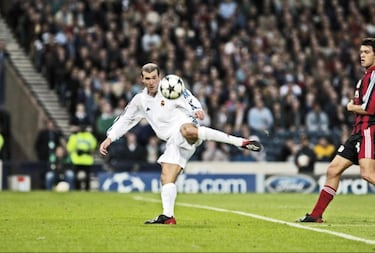
You were brought up in Neukölln, a tough neighbourhood in Berlin. How did that form your character?
It had a big influence, no doubt about it. We were six siblings and there wasn’t a lot of money. Outside, on the streets, it was a very tough area, there were a lot of refugees living there. For me, when I was little, fighting out on the street was fairly normal. That’s how it was. In the end, surviving all of that made me stronger. It made me who I am today. Giving up is not in my DNA, it doesn’t even enter my mind. That’s why my mother used to call me a soldier! Even today I am still the same, very strong-willed. I don’t like losing. I struggle to accept defeat.
Did you suffer any real bad experience in Neukölln, any serious problems?
Thankfully, not really no! Crime was very present, and if you see it every day, it becomes something normal.
Are all of your memories of that time bad?
It’s incredible because we are actually really happy. My family lived in an apartment on the 16th floor of a social housing flat. My parents wouldn’t let me go out onto the balcony because it was very unstable. But it was the best time of my life. For me, family is very important and we were really united. It’s the same now. I miss those times. We didn;t have a lot of money but we had each other, we were rich in that sense. Money was never in our conversations.
What was that small apartment like?
We are four sisters and two brothers so the brothers slept in one room and the sisters in another. The apartment was tiny, but it had three rooms. My parents worked long hours and very hard…
What jobs did they have?
My dad washed plates in a restaurant and my mum looked after the flat. It’s tough seeing your parents working hard like that, you hope that one day you do give them a rest, thankfully I was able to do that.
What was the best lesson they taught you?
They always said: the only way to get success is if you are happy for others. They taught me never to be jealous of others. And that is very important, because today, we live in a world where a lot of people focus too much on what others are doing. They compare themselves to others. I don’t do that. I think that every person, for who they are, is special. That is the best thing they taught me. My mother would always say: “Always respect yourself”. She would talk a lot about showing others respect but first you have to respect yourself. When you do that, you respect others automatically.
You visited Sierra Leona?
It’s great going there. Now I’ve become sort of a role model for the young kids there. In Europe, people moan a lot about being stressed. And you go there and see what real stress is. You tell yourself: “Thank you God for the life you have given me”.
In what ways is it stressful there?
Real stress is not knowing what you are going to eat tomorrow. That’s stress. Here, in Europe, we have everything we need. But we always want more, more, more… Going there is good therapy.
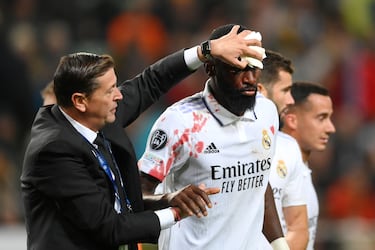
Which players did you idolise as a kid?
You always try and be like the strikers. My favourite was Ronaldo. He was fast, he scored goals… He was the best.
Have you had the chance to meet him?
Not yet. But when I signed for Madrid, we had an opportunity to talk on a video call.
You have worked under several Italian coaches, what are they like?
Conte is incredibly tough, Spalletti is too. Sarri is also very demanding… But Ancelotti is different. He’s a gentleman, he has a lot of experience, he’s calm… He fits in at Madrid like a glove because on the outside, there is so much pressure and you need someone who brings calm, he does that brilliantly.
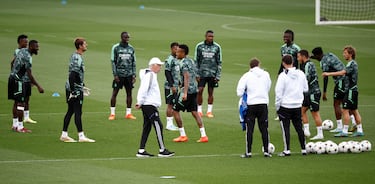
How is your relationship with Ancelotti?
I’d describe it as normal, the same as he has with other players. I feel respected and accepted and for me, I hope that is reciprocated.
Is he a coach who talks a lot to his players?
He comes over to talk and all of that, makes jokes… That’s really good. But I don’t think he sees a need to talk about things every day. In that way, you can see his experience. He knows when he needs to come over, he knows the exact moment.
Is that what makes him different?
Definitely. He knows when he has to talk to you. And you say: “Oh, that’s just what I needed!” That’s what makes him the best.
Can you see yourself retiring here?
Mate, I’ve only been here a few months and you want me to retire! (laughs). I feel good and, if I can still be playing for Real Madrid at 37, like Modric, then I will (laughs).
How do you feel about the World Cup?
It’s exciting. In 2018, I was with Germany, but always on the bench. I was still only young. Now I am enjoying a different role, as one of the leaders. I have worked all my life for this and it’s something that makes me happy. I’m ready.
Have you felt afraid of suffering a serious injury that might have made you miss the World Cup? (He’s missed the last two games with a hip injury).
No, no… Every day I have my treatment and everything is perfect.
🇩🇪💪 @ToniRuediger has been called up for Germany's World Cup squad!@DFB_Team_EN | @FIFAWorldCup | #FIFAWorldCup pic.twitter.com/3hi3z6Iukw
— Real Madrid C.F. 🇬🇧🇺🇸 (@realmadriden) November 10, 2022
How is the situation with Germany? Has the transition period after Joachim Löw been difficult?
Sure. It’s a new era. In 2014 there was an excellent generation - players like Kroos, Götze, Lahm, Schweinsteiger… A lot of great players. But I think the generation we have now is capable of doing something important.
Germany face Spain in the group stage...
It’s a World Cup. If you want to win it, you have to beat the best - and it makes no difference when you meet them. Spain is one of the top teams. Now, since I have been playing in Spain, I can see the number of good players there are here.
Is Spain still a side to be feared like the team that won the World Cup and Euros a few years ago?
Like Germany, it’s a new generation. In football, it’s difficult to give things time… But I think they have a good team, a young team that maybe needs more time.
Do you think we will see a better World Cup seeing as it will be played halfway through the season?
I think so. Playing in summer after 60 or 70 games is very different to doing it after 20 games.
The 🎁 that keeps on giving. pic.twitter.com/b40LET6CIO
— Real Madrid C.F. 🇬🇧🇺🇸 (@realmadriden) November 11, 2022
Related stories
You are 29 and will have another World Cup to look forward to. That’s not the same for Modric. What will football miss when Modric calls it a day?
He’s the Maestro. That’s what I call him: “Maestro”. What he is doing at 37 is out of this world. Even at 37, at a massive club like Madrid, no one’s at his level.
